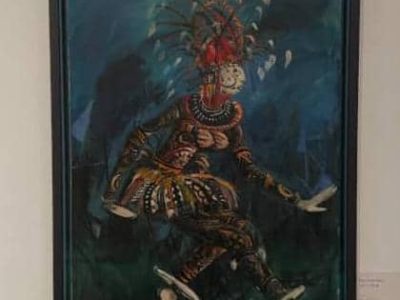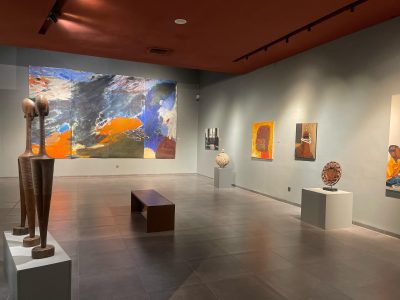In this virtual interview across two time zones with Bimbo Esho, the Managing Director Evergreen Musical Company Limited, she reveals to Yinka Olatunbosun why the Evergreen Music Heritage Foundation is building a music museum while institutionalizing the culture of preserving Nigeria’s evergreen music. What started as a conversation culminated into a mini-town hall discourse on evergreen music culture. Excerpts.
I’m happy to learn about what the Evergreen Musical Company Limited has been doing over the years in preserving the music archives and memories of Nigeria’s evergreen music. For some years that I have been covering music, it is one of those things we talk about in the criticism of the music industry in Nigeria; that we don’t have enough documentation. What really necessitated the establishment of Evergreen Music Heritage Foundation?
It is for the documentation of our history. If we don’t do it, the generation to come will not be able to tap into the music of yesteryears. Most of today’s musicians, even the Afrobeats musicians, are tapping into the music of the yesteryears. If the music is not available, they won’t be able to have such access.
I remember the complete works of Fela Anikulapo-Kuti, a lot of people never knew he had such a collection- about 186 songs. The same with Baba Obey (Chief Ebenezer Obey) when we put together 660 songs that he had done. A lot of people will not believe that this sort of thing is in existence. The foundation is basically taking people back to time and letting them appreciate the efforts that these musicians have put into their works and have something to curate their works for posterity’s sake.
That’s what we are trying to achieve with such an edifice.
I learnt that the edifice will be in Anthony Village, Lagos. Is that true?
Yes, we have bought the building and we want to start renovation soon. That’s why we want people to know that something like this is coming. If you’re interested, you can actually support it. It is not as if you’re begging or seeking for alms. We just believe that people of like minds that believe in such a project like Dr Olukoya and our own few clients have done so because they believe in it. We believe that as many people believe in such a project, that’s where we know what the whole world is actually trying to project.
Do you have a time frame for the completion of the project?
We planned that before the end of this year, we should be able to get it to a very reasonable stage. A lot of funds will go into it because it is not just going to be a regular museum. It’s going to have a lot of state of the art equipment and a lot of things that are rare, vintage materials from some of these legends themselves. A lot of facilities too will be in the place.
Apart from funding, how will you get the archival materials and how accessible to the public will they be? I’m also concerned about how they will be stored. When people are talking about documentation today, they are thinking digital as well. As much as we like the hard evidence of history, people want digital access too. Are you working with a team of tech people to develop this museum?
Yes, when the whole thing is finished, we have a lot of professionals that will dominate the building. We have IT people. There are people who have given us materials that they have kept for more than fifty years and they want to be sure that even when they are gone, nothing will happen to their materials. That’s where insurance comes in. The digital and physical archiving.
For this museum, how long into history are we going to be looking?
What our museum has been doing over the years is that we have discovered that if we don’t do this, all the things that we’ve been doing will go into extinction. So, we have decided to institutionalise it. Distribution and promotion of the music of yesteryears is what we do. That’s why we do events, celebrate artists and promote their works. But beyond that, we have been thinking and going back to the drawing board. They certainly deserve more than this. That’s why we are curating their works.
Most times, we do events to promote these artists but beyond that, we have to curate their works by the likes of Fela, Victor Olaiya and Victor Uwaifo. We want people to know about them and their music.
What’s Evergreen’s relationship with streaming platforms? One of the problems we encounter when we’re looking for some classic music is to get them online. For some, it may be copyright issues.
That’s a very good question. For us, overtime even before the digitalisation started, we had piracy in Nigeria. We had a way of distributing music that even pirates could not touch. We started with proper packaging that is not cheap. We repackage music.
Today, there are different ways of buying music. Some people still buy CDs. We sell in mp3 formats as well. Some buy music through streaming platforms. We have captured everything. Some of them send funds to us quarterly for sold music. They show us the chart of what the music is doing. We need to be careful with the digital world because we found out that some artists put their works out there and even pay for their songs to be downloaded free. A lot of artists do that because they are naive. It’s especially the young ones who do it.
Most artists are stronger on their creative side than on their business side. Would you say that your organisation has helped to fix that?

Bimbo Esho
Even on the streaming sites, you cannot know what is being sold. It takes a tech savvy person to understand the data analysis that they share with us. In terms of business, we always advise artists that beyond music, they should have an alternative source of livelihood. That’s what we tell indigenous artists. It is dangerous to lean on music for survival. What if the shows are not coming in? What if the music does not sell? But it has changed a little due to digital streaming. Most artists depend solely on the sales from these platforms right now. It is not through shows anymore. It is only the Alist artists who make money from concerts.
But even when old artists die, their family members can collect their royalties. Evergreen songs can never fade. A new artist can remix it. We have experienced it with Seyi Shodimu and Shaffy did ‘Love Me Jeje.’ Tems did a remake. And if someone uses the song on TikTok and it goes viral, then it can make people understand the song more. Then, sometimes people can generate controversies around the song, most artists don’t know a lot of these tricks. You know Nigerians “don’t like peace…”
Yes, they love vawulence. (Laughs)
(Laughs) When everything is quiet, they don’t like it. Wasiu and his band boys talk made the artist trend. Controversy sells.
How difficult could it be to acquire the catalog of musicians whose record labels are no longer in existence?
It wasn’t difficult. You can approach the artists or their family members. Music is like property. Most of the record labels are dead. There is nothing anybody can do about it but the artist has left a legacy- a property. And that property is his music. And his family is deserving of that right. That’s why we advise artists to get an Estate to protect the artist’s right.
My dad started collecting most of these works at the age of 12. He didn’t know it would be used for business.
We’re in a generation where people tend to be disrespectful of the past achievements of others. And they evaluate people based on current income and net worth. What do you think is responsible?

Bimbo Esho and her now late father, Femi Esho
I was talking to an older artist and he told me that young people wonder how come he is very broke despite playing with Bob Marley and other big names in music. The young people cannot understand that.
What did you think went wrong with the older generation of artists?
(Laughs) I think you might know what went wrong. What I can say is that they were more interested in the passion of creating music than the business side of it. They were totally interested in the music. It was so early in life and they didn’t have role models. Music was just a passion. They felt they were ripped off by the record labels and some of them are still owed some money. If you check their contract, you’d find out that indeed some of them had sold their birthright to the record companies. They are not able to make money. Abioro and KSA felt cheated. Those of them that were smart made good money. Ebenezer was smart. He even bought a record label- Decca. Who does that? He bought it over and bought all the music on the label. So the question is how do you sign a contract that gives away your rights? They can’t even use or perform their hit songs because it belongs to their record label. Don’t just sign. Let a lawyer see the contract before you sign.
There was a time an icon told me that he just saw his song in the UK at a supermarket well packaged. He didn’t know about it until he saw it. Artists make mistakes when they don’t know the secret of the trade.
Should we expect that your foundation would educate more young people about the business side of music?
One of the greatest things that we can do for humanity is to develop a young mind to become who he or she wants to be. That’s the greatest thing we can do for humanity. Some of them are not supposed to do music. They may not have the talent. If you don’t have a good voice, you can get trained. Shina Peters didn’t have a good voice but he got trained. When he was with Prince Adekunle, he was playing guitar. Segun Adewale was the one doing the vocals. But when he broke out, he made hits. Sometimes, your voice won’t work.
Lifestyle also matters. The womanizers don’t save for the future. When the money comes, they don’t manage resources.
You must have had some solid music education and pedigree to do what you do. Can you give us a glimpse into your educational background?
I went to Mayflower primary and secondary and University of Ibadan to study anthropology. As per the professional aspect, my mind is still busy. My dad taught us everything. What makes me versed is that I did a little bit of journalism. Once you are interviewing you get to know a lot of things.
Someone called me and said he wanted to do something in Ijebu and needed classical music by Ijebu musicians. Those are things we want to achieve. We don’t want to hoard it. You know Evi Edna Ogoli? She is in France, I think. She left Nigeria a long time ago.
I would love to see a comprehensive documentary on Nigerian music from your organisation.
Yes, I think that’s where we are all going now. From 1914 till date, we need to do that
Yes. When you want to interview some of these artists, they decline. When they die, you will know that you have lost a library. Are there some artists that are doing well now after you rediscover them?
Victor Olaiya did a remake of Baby Jowo with Tuface which was originally recorded as ‘Mofe Muyan.’ He made some good money from that project.
Have you received any support from the government yet?
We need people who have ears into what we are doing. Every artist has state. So, whether they like it or not, all states have to be involved. The museum we have will have vinyls of the artists in alphabetical order. I was listening to Onyeka Onwenu’s Danulu song. The song is a prayer song in Ibo but I love the song. Where do I find the song? Evergreen Music. That’s what we are trying to do. Curate music from every part of the country.
Have you heard of Tera Kota…Nigeria’s first reggae artist? His name is Gboyega Femi. He came before the likes of Ras Kimono and Majek Fashek. He did about four albums but then he died. When you listen to some of his songs like Lamentations from Sodom…then
We want people to come and it’s going to be like an experience centre. If we don’t do it, no one will. Everyone is just getting distracted by this generation’s songs.
Most of the new artists don’t make timeless songs. If there is no foundation to preserve music culture in Nigeria, their music may be lost in the stream of music.
This generation is doing music for fun. And it is a reflection of the sort of cultural value that we have built. Music is a function of the society that we have built. The moral decadence is reflected in the lyrics and the way the music spread is fast. The internet has done a lot of good and damage. Musicians forget that they are role models and they should not fail in their role because if they do, they are destroying generations of young people. The truth is that do you really care? Music is spiritual. And the artist is like a semi God.
*Bimbo Esho’s father, Femi Esho died after this interview was conducted at age 77 on June 17. Gazelle Africa extends a condolence message to the family.



















